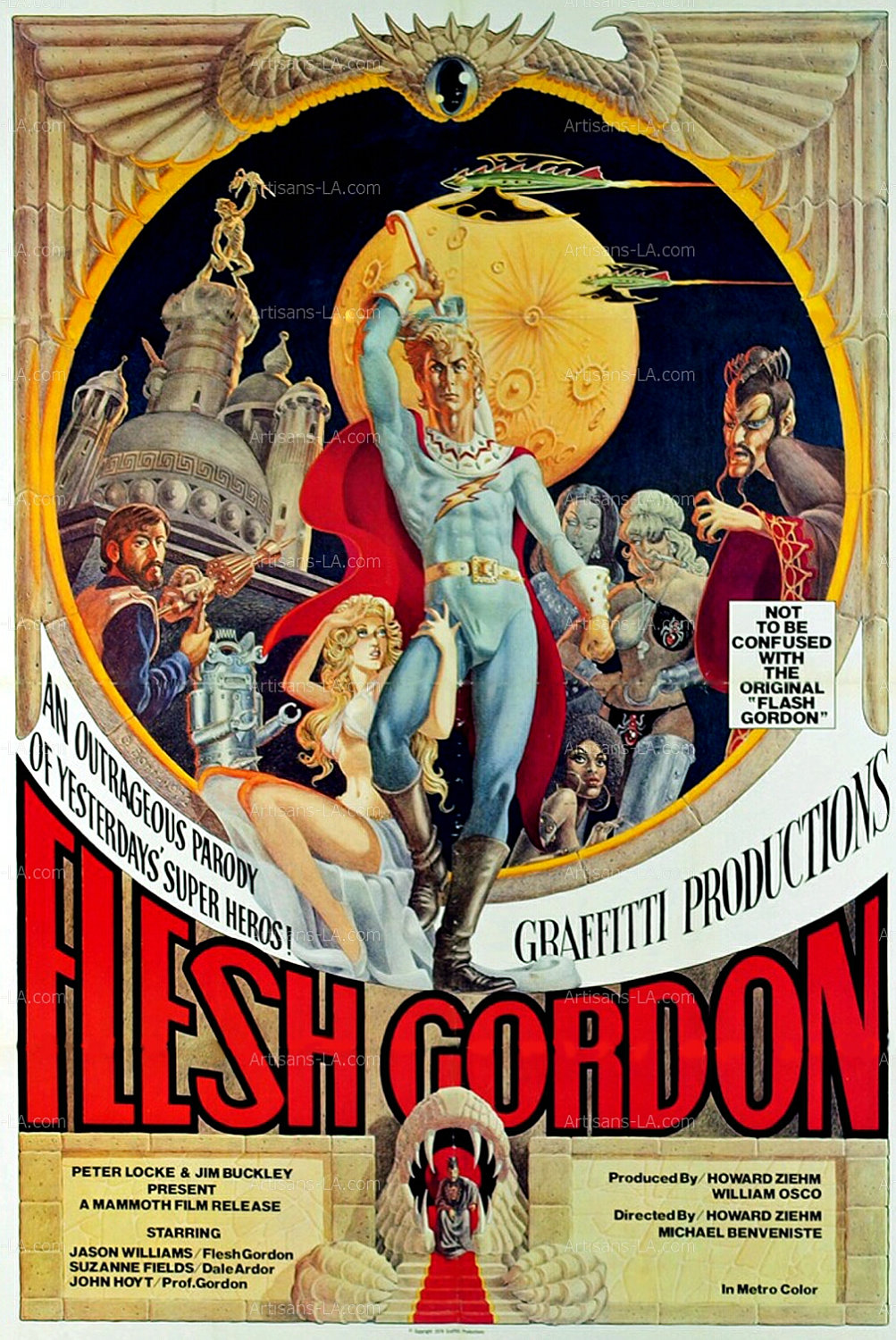Thursday, November 21, 1974
THE LAST PLACE AN EX-Boy Scout expects to meet his former scoutmaster is the Georgia Straight office. Recently, though, Straight writer Brian Giles looked up to see Bob Porter, his former troop leader, taking out ads for Flesh Gordon, a movie Porter calls "the dirtiest picture I ever saw."
Last Friday [November 15, 1974], after one sell-out preview screening, that picture moved into Granville Street's 680-seat Odeon Theatre for its Canadian premiere engagement. Its first three days set one house record after another, and the theatre chain's Toronto headquarters has decided to open the erotic comedy across the country.
That decision is a source of great satisfaction both to Porter, the Burnaby businessman who holds the film's Canadian rights, and to Odeon's B.C. district manager Norm Reay, who recommended the booking to Toronto in the first place.
Normally, all first-run booking decisions are made in Toronto, and there have been occasions when the local office has been less than joyful about the results. Despite Odeon board chairman Christopher Salmon's recent assertion that "we refuse to play junk," his Toronto bookers have managed to drop a lot of garbage into the Hyland Theatre's schedule this year.
In the case of Flesh Gordon, the East-West information flow was momentarily reversed. It was the Vancouver office that first recognized the film's success potential. It was a local decision to seize the initiative and premiere the serial-hero parody on Granville Street's Theatre Row.
Particularly pleased is novice distributor Porter, who told me in an interview that his recent involvement in the movie business is "strictly a fun thing." A man who sees few films and thinks of him self as a "Sound of Music type," Porter climbed aboard Flesh's rocket almost by happenstance.
"I guess you'd call me a construction entrepreneur," he says. "I'm in the business of buying old buildings, renovating them, then leasing, holding or selling them." Among his holdings is the Vancouver Film Exchange Building, home to most of the city's major film distribution companies.
That, he says, is just a coincidence. He never thought about investing in movies until last year, when a friend showed him a magazine article about the making of Flesh Gordon. The film's producers had run out of money and needed about $20,000 to pay for a musical score.
Among Porter's 1972 acquisitions was 12th Avenue's Studio Three recording complex. With that in mind, he flew to Hollywood to talk to moviemaker Howard Ziehm.
"I thought he was an honest person," Porter says. "To me that means a hell of a lot." For his investment, Porter got complete rights to the music and a percentage of the picture.
Later, he made a deal for Canadian distribution rights. Somehow lost in the shuffle were Porter's plans to handle the music recording at Studio Three. The soundtrack was added in Hollywood.
Not being familiar with the film business, he decided to seek some professional advice. In June, he held a private screening for some local exhibitors to determine two things. First, whether or not it would be worthwhile submitting his film to the B.C. Classifier; and second, whether it had any commercial potential.
Ron Keillor, Odeon's local booker, offered non-committal encouragement. At 101 minutes, the film was "interesting, but quite dull," he said.
Keillor's reaction was not atypical. In Hollywood, Ziehm saw to it that his comedy was trimmed to a lean 70 minutes. When the new print became available, Odeon offered to book it as a special midnight program.
Porter refused. Ziehm didn't want his film getting a reputation for being ''a midnight special." The Telexes clattered between Vancouver and Toronto, and Odeon's head office accepted Reay's advice that Flesh Gordon be immediately booked into the chain's local flagship theatre.
It's there, says Keillor, because "we think (the picture is) a considerable step above mere money-making trash. It's good entertainment."
Has his remarkable run of beginner's luck given Porter a touch of film fever?
"No way," he says. ''There are too darn many promoters in this business. This was a fun thing but I don't need any more movie investments."
The above is a restored version of a Province interview by Michael Walsh originally published in 1974. For additional information on this archived material, please visit my FAQ.
Afterword: Founded as an underground newspaper in 1967, Vancouver's Georgia Straight was part of an alternative press movement that included the Berkeley Barb, the Chicago Seed and the East Village Other. Born as a voice of the counterculture, its advocacy of sex, drugs and rock 'n' roll created anger and outrage among establishmentarians. In its early days, it was subjected to police raids, obscenity fines and flat-out political persecution. It survived and by 1974, the year Bob Porter visited to place his Flesh Gordon ads, it was in the process of reinventing itself as the money-making "news and entertainment weekly" that is a part of the B.C. media landscape to this day.
By contrast, Granville Street's Odeon Theatre is long gone. Renovated as a seven-screen multiplex in 1987, it was renamed Granville Cinemas. It finally shut down in 2012. The Hyland Theatre on Kingsway had already closed in 1979, the same year that its original owner, the Toronto-based Odeon Theatres of Canada, was acquired by entertainment entrepreneur Garth Drabinsky's Cineplex Corporation to become Cineplex Odeon. In 1998, the Canadian company merged with New York-based Loews Theatres to become Loews Cineplex Entertainment . . . and on and on. The Vancouver Film Exchange Building on 12th Avenue was demolished in the 1990s to make room for a condominium development. And, true to his word, investor Bob Porter bowed out of the movie business. Flesh Gordon's B.C. angel died in 2009 at the age of 85.
